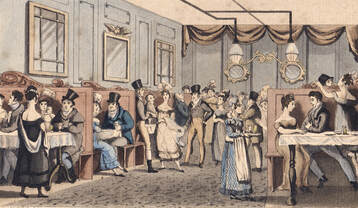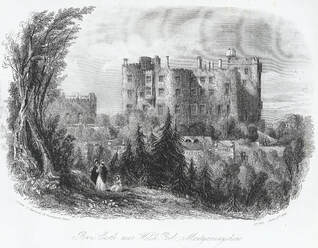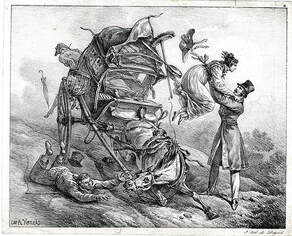| "I think it is fair to say that while no-one is ever going to mistake... Meeke’s writing for great literature, she certainly does keep you turning the pages." – Blogger Liz at A Course of Steady Reading |
| |
 Dashing young man with "Brutus" hairstyle.
Dashing young man with "Brutus" hairstyle. This time, I’m reviewing Stratagems Defeated (1811), a four-volume effort by Mrs. Meeke, a prolific authoress who wrote for Minerva Press, a publishing house that specialized in knock-off gothic novels and other sensational fare. It seems her works were a guilty pleasure for the British statesman Thomas Babington Macaulay; he read them avidly, but surreptitiously noted their titles in his journal in Greek.
Mrs. Meeke may have been a stepsister to the successful authors Frances Burney and Sarah Harriet Burney, but she didn’t use the Burney name on her title pages. Instead she published under the pseudonym “Gabrielli,” a name which connotes Italian exoticism. Stratagems Defeated features a wily Sicilian priest and not one, but two people held prisoner by someone trying to force them into marriage, but it is not a gothic novel. Neither is it a tender romance-- the female love interest doesn’t even show up until the final volume, and there are no impediments to keep hero and heroine apart once they meet. In fact, by the time they meet, the hero is the most ridiculously eligible bachelor in the United Kingdom.
 Going out for oysters
Going out for oysters In the first volume we spend all our time with the merchant classes, which I thought was rather unusual since novels of this period are more preoccupied with the wealthy and titled. Meeke gives us a colourful cast of London characters; this first section reminds me more of Dickens than Austen. Are any women engaged in business in Austen, outside of Mrs. Goddard in Emma? In Stratagems Defeated, we meet an avaricious milliner, a gossipy woman who runs an oyster-bar, and several women who competently run inns and “eating-rooms.” As for the men, there are roguish young clerks who live beyond their means, there’s a miserly tobacconist and there are wealthy merchants. There is no condemnation of colonial fortunes; on the contrary, Mr. Hamilton, a West-India merchant, is one of the good guys. His chief clerk overworks his underlings like a “negro-driver” when the boss is away but apart from that, there is no mention of the slave trade.
 Priggish Hirsch with wacky coworkers
Priggish Hirsch with wacky coworkers Edgar learns that he is the heir to the Earl of Huntingdon because he is the only surviving male relative on his father's side. (This revelation doesn't come at the end of the novel, but near the end of volume one.) Edgar vows to remain on friendly terms with the kindly clergyman who raised him, the schoolteacher who educated him, and his best friend from the counting-house, but soon realizes that his patrician grandfather intends to manipulate him into dropping his lower-class connections. I assumed that we wouldn’t hear anything more about most of the characters from volume one but that wasn’t the case. Their sub-plots and antics formed the most entertaining part of the novel, even as Meeke adds more dramatic complications involving a new cast of wealthy and nobly-born characters.
Stratagems Defeated should make it abundantly clear that Jane Austen was hardly unique in mentioning the income and financial prospects of her characters. Meeke dwells at length on wills and inheritances, lawsuits and marriage settlements. Here, for example, are the details about the Owensons, who are very minor characters: Mr. Owenson “had a very handsome income, and when he died, he left [his daughter] eighteen thousand pounds, independent of her mother, to whom he left Dunraken Castle, and a thousand a-year, which is also secured to her daughter at her demise: Mrs. Owenson is besides heir-at-law to Mr. Tudor, of Carador House, who cannot, I believe, deprive her of the principal part of his Welch estates, though I have heard it whispered that he might cut off the entail."
 Exotic Welsh atmosphere
Exotic Welsh atmosphere The next question to consider is: did Austen or Meeke intend a social message? Some modern scholars contend that Austen was protesting against her patriarchal society and its institutions like primogeniture. If that is so, then Austen has nothing on Meeke. Sense & Sensibility features three sisters who lose out when their wealthy relative dies. In Stratagems Defeated, we have an absolute smorgasbord of villainy:
- a girl's brother-in-law claims she’s insane and can’t inherit her father’s estate,
- a corrupt guardian cheats numerous wards and widows out of their inheritances,
- somebody forges a will to deprive the heirs of their property and money--not once but twice,
- a man is bribed to marry a girl he doesn’t love so the hero won’t marry her.
Or, if the secret message of Northanger Abbey is that marriage and giving birth is often fatal for women, Austen again has nothing on Meeke. None of the younger main characters have a living mother and father; most have neither.
As for the literary features of this book, I was struck by Meeke’s tendency to spin out lengthy sentences with a never-failing stream of commas and semi-colons. We can speculate that her prolix prose style is a reflection of her financial need to churn out three and four volume novels to support herself after her first marriage fell apart. Therefore we get plenty of details. We learn how people are dressed, whether they eat dinner early or fashionably late, how many servants attend them, and all their travel details. As it happens, most of these every-day details were of interest to me, because they're the kind of details that Jane Austen leaves out. The following excerpt gives an idea of the run-on sentences and the level of prosaic detail: the hero and his friend are travelling to Bath by post-chaise, and Edgar's loyal valet Harris is riding on ahead to an inn owned by his family, to have everything in readiness:
| At Reading [Edgar and John] alighted while the horses were changing, and as it was past two, they ate some cold fowl and ham, and drank a few glasses of sherry, not meaning to dine before they reached Hungerford, which they told Harris, who begged leave to ride forward from thence; the footman could take his place upon the box, and as he was known at Speen-Hill, he should not be required to wait the arrival of the carriage; but might, by this means, have dinner ready against his Lordship’s arrival. Edgar made no objection to his proposal; and as the postillions were well paid, the day cool, and the roads good, they got on very fast. |
Another feature of the novel that surprised me is that the author teases us about introducing a love interest for the hero. I’ve learned from reviews of Meeke’s earlier novels posted at the “Course of Steady Reading” blog that she specialized in putting surprise twists and red herrings in her plots, which often centered around a male Cinderella figure. She “has fun playing with her readers’ expectations…”
In volume 2 of Stratagems Defeated, Edgar and his friend John witness a carriage accident during the afore-mentioned trip to Bath. Meeke uses the accident to:
- editorialize against reckless driving,
- create a sub-plot about the theft of some jewels by an acquaintance of Edgar's who coincidentally was in the wrecked carriage, and
- tease her readers about the non-appearance of the heroine:
| By this time the friends had extricated two ladies and an elderly gentleman from the coach. “'The heroine, of course," cries a female reader, well versed in such novel adventures. We agree that overturns, runaway horses, running streams, and thunder-storms, are often the means of introducing the hero to his fair intended, but we are not so indecorous as to place the future wife of a peer in a stage-coach, therefore, the ladies above-mentioned are by no means concerned in our story, since they were merely returning to Exeter, having been on a visit to a relation in London… |
 Les accidents de voiture
Les accidents de voiture Other features of interest:
- There is more mention of Bonaparte than you'll find in an Austen novel.
- The characters twice cite Lord Mansfield (the British jurist after whom Mansfield Park is supposedly named), but they don’t mention his ruling against slavery in the United Kingdom, they reference his thoughts on bankruptcy.
- The hero remarks that he prefers the novel Celia in Search of a Husband to the original best-seller Coelebs in Search of a Wife. Celia was written to cash in on the popularity of Coelebs, so we have one Minerva Press novel (Stratagems Defeated) recommending another Minerva Press novel (Celia). Talk about product placement.
- The novel's ending is definitely not one of your concise Austen-style summations. Meeke ties up a lot of plot points with her customary detail, and lets us know the fate of every character of note.
| About Mrs. Meeke Scholar Simon Macdonald first discovered that the prolific author Mrs. Meeke was Elizabeth Meeke, a Burney step-sister with a colourful marital history. Some references still list “Mrs. Meeke” as “Mary Meeke,” the wife of a minister. Anthony Mandal says Mrs. Meeke was "The most prolific novelist of the romantic era... whose twenty-six original novels and four translations, published over a period of almost thirty years, eclipsed even Sir Walter Scott’s famous output." The Feminist Companion to Literature in English says that Meeke wrote to a pattern: "She writes grippingly, especially in dramatic or low-life openings... before the nobility appear." In the preamble to her 1802 novel Midnight Weddings, Meeke wrote that novelists had already exhausted all possible plot ideas. She was not “enough within the vortex of fashion to exhibit the follies of its votaries to great advantage,” that is, she did not move in the highest circles of society and could write more convincingly about a tobacco shop than a stately mansion. She also advised aspiring writers to “consult the taste” of their publishers, “for should you fail of meeting with a purchaser [for your novel], that labour you hope will immortalize you is absolutely lost.” More modern-day Meeke reviews at this blog, "Only a Novel." Thomas, William. The Journals of Thomas Babington Macaulay Vol 1. United Kingdom, Taylor & Francis, 2021. Anthony Mandal; "Mrs. Meeke and Minerva: The Mystery of the Marketplace." Eighteenth-Century Life 1 April 2018; 42 (2): 131–151 Previous post: "Fanny found herself obliged to yield" Next post: Charitable heroines |

 RSS Feed
RSS Feed